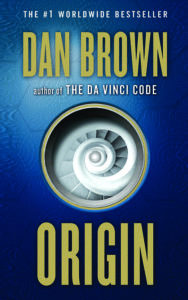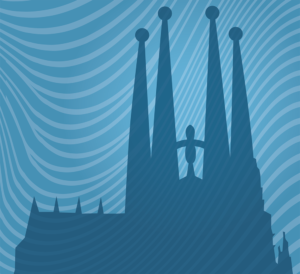Origin: A Novel

BY DAN BROWN
ANCHOR, 2018
656 PP.; $9.99
Dan Brown has written a succession of enormously successful thrillers, including The Da Vinci Code and others in the Robert Langdon series. You find them in airport kiosks and other such places merchandisers save for only the best of the best in popular sales. Origin is the latest in the series and may give us more proof of Brown’s enviable Midas touch.
Or will it? The book’s basic structure is serviceable, complete with a very long chase involving good guys (and their female compatriot) being pursued by malevolent forces that ends in a burst of glory. It has a suitable cast, centered on the hero, Harvard Professor Robert Langdon, a heroine, and a polymath genius who has built a computer named Winston that can do just about everything. The setting is modern-day Spain, populated by the architectural and visual masterworks of avant-garde geniuses as well as by the titans of the past. All of this is written up in a racy, comfortable style that keeps you reading faster than you knew you could, which is just as well, as it is a rather long book.
Origin’s central theme is what keeps it from becoming just another cliché. Where do we come from, and where will we go? These are questions thoughtful people have been asking ever since there were thoughtful people, according to the author, and what elevates this book above the level of a normal thriller is Brown’s effort to endow his polymath genius with answers. I shall focus on these answers and let you assume that even without them, it’s a good, fast-moving yarn if that’s what you like.
 Where do we come from? First, the book disposes of the God business in ways that will be satisfactory to most humanists. Brown even uses some slogans reminiscent of ours and quotes Richard Dawkins, Daniel Dennett, and Sam Harris, among others. Creationism is not the answer, no way. It is only when the author steps into the more difficult issue of the origin of life itself that he falters.
Where do we come from? First, the book disposes of the God business in ways that will be satisfactory to most humanists. Brown even uses some slogans reminiscent of ours and quotes Richard Dawkins, Daniel Dennett, and Sam Harris, among others. Creationism is not the answer, no way. It is only when the author steps into the more difficult issue of the origin of life itself that he falters.
I’ve been struggling with this question, too, and have been reading and rereading Nick Lane’s The Vital Question, emphatically not an easy read. The best I can get out of Lane’s highly technical argument is that life began with an unlikely combination of building blocks that converted light into the kind of energy that propels our bodies. Like photosynthesis but for animals. If you can accept that, then Brown’s version, based on elaborate mathematical probability, is way off the mark. But it’s a nice try.
That leads us to the next question: Where will we go? Here, Brown bravely tackles the “singularity” issue. Are computers going to improve so much they don’t need us anymore, and then what will they do with us? Brown’s polymath thinks he can foretell the future by examining a huge number of probable outcomes to a given set of circumstances. Fair enough, except that the author doesn’t deal with the concept of infinity in a way I find plausible. He just jumps to a rosy outcome where humans and creatures, governed by artificial intelligence, all cooperate to fashion a utopia. Nice, but not the persuasive argument grounded in known science that we had been led to expect.
I suppose I should recommend this book because it rejects the God doctrine and does raise serious issues. Maybe nobody can answer these issues—not yet anyway. Thank you, Dan Brown, for at least entertaining them.
